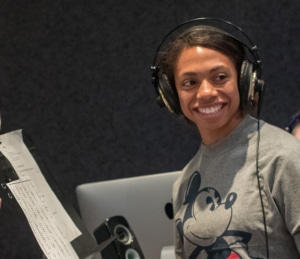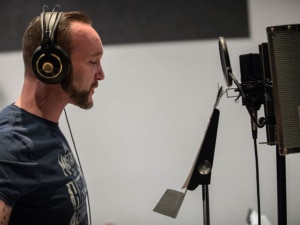DCPA NEWS CENTER
Enjoy the best stories and perspectives from the theatre world today.
Enjoy the best stories and perspectives from the theatre world today.
Cartoon superheros, talking cleaning bottles, instructional videos, the audiobook version of that best seller, and even some of the questions heard on the radio — these are all done by voiceover artists.

Mare Trevathan
“It can be so very broad. I think of voiceover as being anytime you hear a voice without the face of the person speaking,” said Mare Trevathan, a professional voiceover artist and one of the instructors on the subject at the Denver Center for the Performing Arts. “With that in mind, to me, there is a big distinction between radio and podcasts vs. interpreting scripts.”
Trevathan has narrated over 500 recorded titles, about five a month, she said. She also has performed with Denver Center Theatre Company, Colorado Shakespeare Festival, Curious Theatre Company, Colorado Symphony Orchestra, and a myriad companies across the West. One of her favorite jobs was narrating novels by author Ann Patchett and voicing a talking sword for another book.
While Trevathan’s days aren’t cut and dry, on the day of our interview she went down into her makeshift recording studio in the basement of her house around 8:15am to do a radio call for an East Coast station, and then another one. After the calls she worked on narrating a commercial audiobook, had a “lovely conversation with Linnea Covington about voiceover,” took another radio call, narrated an article and started work on more audiobooks.

DCPA Education Voice Over Classes
If she sounds busy, she is. Voiceover work plays into everyday life a lot more than most people think, and it’s a skill that’s both needed and profitable. It’s also a skill one needs to learn and isn’t as easy as making a convincing duck sound, reciting poetry perfectly or nailing that British accent.
You may have been told you have a “good voice” which is helpful, but it’s not a reason to launch a career in doing voiceovers. To understand more about the industry, Trevathan advised listening to podcasts about voiceover such as the VO School Podcast and The Voice Coach Podcast with Nic Redman.
“It’s important people understand all voices are good voices, it’s just understanding what’s right for any given situation,” said Trevathan, who mentioned a woman she knows who has a baby-like voice perfect for toys, but not great for books or instructional videos. “Even if you have a traditionally ‘good voice,’ which is about five-percent of people, it’s more about what you can do with it.”

DCPA Education Voice Over Classes
Trevathan stresses a few key things for those who want to get into the voiceover game. Before you take a voiceover class, start with acting.
“An acting class will speed up any work you will do in a voiceover class, and you will learn how to create circumstances that directly support a voiceover script you’re working on,” she said. “This will give you distinction as a voiceover actor.”
Another key in learning to be a successful voiceover artist is improv, and taking a class or two in improvised acting can really help. Especially, explained Trevathan, in the age of artificial intelligence. Turns out AI can do a lot, but it can’t improvise a situation, conversation or perfectly read passages with emotion. That’s where professional narrators come in, to literally add life to written word through sound alone.
Then, of course, taking classes with a professional voiceover artist will set you up for success.
“I don’t feel like people are wasting their time and money on dreamland. There is work out there for people who can and want to put in the time and energy into voiceover,” added Trevathan. “Anyone can be a talking sword, but they may not get paid for it.”
